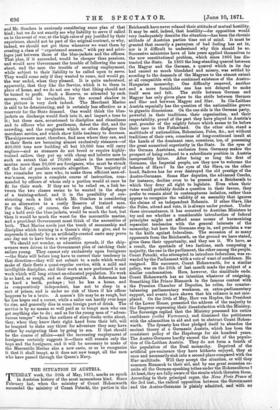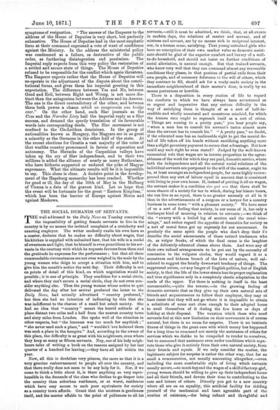THE SITUATION IN AUSTRIA.
TUESDAY week, the 30th of May, 1871, marks an epoch in Austrian history of the most momentous kind. Since February last, when the ministry of Count Hohenwarth succeeded the ministry of Count Potocki, the parties in the
Reichsrath have never relaxed their attitude of mutual hostility. It may be said, indeed, that hostility—for opposition would very inadequately describe the situation—has been the chronic attitude of Austrian parties time out of mind. It must be granted that recently a paroxysm of bad feeling has set in, nor is it difficult to understand why this should be so. Successive ministries have of late years applied themselves to the new constitutional problem, which since 1866 has dis- tracted the State. In 1866 the long-standing quarrel between the Magyar and the German, a quarrel which in its day had caused so much bloodshed and misery, was settled by acceding to the demands of the Magyars to the utmost extent at all compatible with the continued existence of the Austro- Hungarian monarchy. One difficulty removed, another and a more formidable one has not delayed to make itself seen and felt. The strife between German and Magyar has only given place to the strife between German and Slav and between Magyar and Slay. In Cis-Leithan Austria especially has the question of the nationalities grown to gigantic dimensions. On the one side is the German party, powerful in their traditions, their organization, and their respectability, proud of the part they have played in Austria's past, prouder of the mighty future which seems to lie before their race in the Fatherland. On the other side, stand a multitude of nationalities, Bohemians, Poles, &c., not without traditions of their own, conscious of long-continued insult at the hands of the dominant race, conscious, too, of possessing the great numerical superiority in the State. In the eyes of the German Austrians, exclusion from Germany makes the prospect of being reduced to a subordinate position in Austria
inexpressibly bitter. After being so long the first of Germans, the Imperial people, are they now to welcome the behests of Slays? In the eyes of the Slays, on the other hand, Sadowa has for ever destroyed the old prestige of the Austro-Germans. Some Slav deputies, the advanced Czechs, for instance, decline even to be present at a Reichsrath to which they deny all right to legislate. Even when their votes would probably decide a question in their favour, they prefer to remain aloof in contemptuous isolation, rather than appear to recognize the validity of an assembly that ignores the claims of an independent Bohemia. If other Slays, like the Poles, attend and vote, it is always under protest. Under these circumstances, it has occurred to Austrian Ministers to try and see whether a considerable introduction of federal principles might not afford some means of harmonizing separatist tendencies with the general interests of the monarchy, but here the Germans step in, and proclaim a war to the knife against federalism. The secession of so many opponents from the Reichsrath, on the ground we have stated, gives them their opportunity, and they use it. We have, as a result, the spectacle of two factions, each composing a majority, the one in the parliament, the other among the people. Count Potocki, who attempted to introduce federalism, was re- warded by the Parliament with a vote of want of confidence. He resigned. His successor, Count Hohenwarth, for a similar policy, was on the 26th of last month made the subject of a similar condemnation. Here, however, the similitude ends. Count Hohenwarth has no intention whatever of resigning. Something like Prince Bismarck in the famous contest with the Prussian Chamber of Deputies, he relies, for counter- balancing parliamentary weakness, on extra-parliamentary support, and events have shown that his reliance is not mis- placed. On the 30th of May, Herr von Hopfen, the President of the Lower House, presented the address of the majority to the Emperor expressing their dissatisfaction with the Ministry. The Sovereign replied that the Ministry possessed his entire confidence (volle,s Vertrauen), and dismissed the petitioners with the admonition to aid and not to obstruct Count Hohen- warth. The dynasty has thus pledged itself to abandon the ancient theory of a Germanic Austria, which has been the consistent policy of the Hapsburgs for six hundred years. The Austro-Germans hardly exceed the third of the popula- tion of Cis-Leithan Austria. They do not form a fourth of the population of the Dual monarchy. Deprived of the artificial pre-eminence they have hitherto enjoyed, they at once and necessarily sink into a second place compared with the Slav multitude. Will they accept the situation, or will they summon Bismarck to their aid, and by one great secession re- unite all the German-speaking tribes under the Hohenzollerns ? At least, they are fully aware of the straits which threaten them. According to their principal organ, the Neue Freie Presse of the 3rd inst., the radical opposition between the Government and the Austro-Germans is plainly admitted, and with no symptoms of resignation. "The answer of the Emperor to the address of the House of Deputies is very short, but perfectly exhaustive. The House of Deputies had in the most emphatic form at their command expressed a vote of want of confidence against the Ministry. In the address the ministerial policy was condemned as a failure, as destructive of the public order, as furthering disintegration and pessimism. The Imperial reply expects from this very policy the restoration of a settled and secure state of things. The House of Deputies refused to be responsible for the conflict which again threatens. The Emperor expects rather that the House of Deputies will co-operate in the adjustment of the dispute about the consti- tutional forms, and gives them his imperial greeting in this expectation. The difference between Yes and No, between Good and Evil, between Right and Wrong, is not more dis- tinct than the antagonism between the Address and its Answer. The one is the direct contradictory of the other, and between them both yawns a chasm which no compromise can bridge over." On the other hand, such Slav journals as the Czas and the Narodni Listy hail the imperial reply as a Slav success, and demand the speedy translation of its favourable words into corresponding deeds. The Slav movement is not confined to the Cis-Leithan dominions. In the group of nationalities known as Hungary, the Magyars are in as great a minority as the Germans in the other half of the state. At the recent elections for Croatia a vast majority of the votes of that warlike country pronounced in favour of separation and autonomy. The Slovacks of the Carpathian valleys have taken up the cry of Slav independence, and to their two millions is added the alliance of nearly as many Ruthenians, who have hitherto supported or endured the yoke of Magyar supremacy. What the ultimate results will be it is impossible to say. This alone is clear. A decisive point in the develop- ment of the Hapsburg monarchy has been reached. Whether for good or ill, the day of the 30th of May in the Hofburg of Vienna is a date of the gravest kind. Let us hope that the event will be fortunate for the great "Eastern Kingdom," which has been the barrier of Europe against Mecca and against Moskowa.



































 Previous page
Previous page